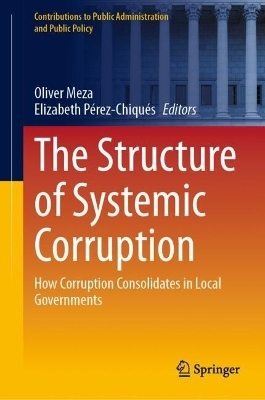
The Structure of Systemic Corruption
Springer International Publishing (Verlag)
978-3-031-64116-9 (ISBN)
- Noch nicht erschienen - erscheint am 08.10.2024
- Versandkostenfrei innerhalb Deutschlands
- Auch auf Rechnung
- Verfügbarkeit in der Filiale vor Ort prüfen
- Artikel merken
This book presents a series of interconnected studies designed to understand systemic corruption in local governments. Coined as the Corruption Consolidation Framework (CCF), this novel approach elucidates how corruption becomes the rule in formal institutional settings and further consolidates. The CCF analyzes the problem along four dimensions, offering a unique contribution to make sense of a complex problem without oversimplifying the subject. Chapters in the book explore the CCF in case studies conducted across Latin American municipalities in Mexico, Brazil, Chile, and Puerto Rico, however, authors believe the CCF is applicable around the world both in the Global South and in Western countries. The volume is a promising tool for the academic community in the public administration, policy studies, and local government fields. It can also be used in undergraduate and graduate courses on corruption, governance, local governments, and Latin American studies. Finally, it offers a general roadmap to citizens and policymakers about what can be done in cases where corruption has become the rule of the game in local governments.
Since the famous book of Klitgaard Corrupt Cities, the world has been waiting for a follow-up on municipal corruption. This collection of LA studies crosses the borders of the continent and makes indispensable reading for students of corruption and local government everywhere -- Alina Mungiu-Pippidi, Professor at LUISS Guido Carli. Author of "The Quest for Good Governance. How Societies Build Control of Corruption"
The book fills this gap and takes the reader on an enlightening journey into the world of systemic corruption in municipalities through a collection of well-written chapters with a concept that unifies these cases in a theoretically grounded yet highly applicable framework. -- David Jancsics, Professor at San Diego State University. Author of "Sociology of Corruption: Patterns of Illegal Association in Hungary"
Theoretically rich and empirically rigorous, this volume provides a fresh, grounded perspective on the governments residents most often engage. It is a must-read for scholars and practitioners alike. -- Patricia Strach, Professor at Albany, State University of New York. Author of The Politics of Trash: How Governments Used Corruption to Clean Cities, 1890-1929
The framework of corruption consolidation helps explain appropriately how this phenomenon can become the status quo of governance in institutionally weak public administrations. It is a must-read to analyze and understand corruption in the global South. -- Pablo Sanabria-Pulido at Florida Atlantic University.
Oliver Meza is Associate Professor at the Centro de Investigación y Docencia Económicas' (CIDE) Division of Public Administration (Mexico). He is mostly interested in local government's policy agendas, local governance and corruption. Recently he has developed work around public officials' noncompliance, citizen dissatisfaction, corruption consolidation, institutional logics and implementation frontline workers policy tactics. In 2020, he was awarded for his research by the Mexican Science Academy.
Elizabeth Pérez-Chiqués is Assistant Professor at the Centro de Investigación y Docencia Económicas' (CIDE) Division of Public Administration (Mexico). Her research agenda focuses on government corruption, public personnel management, and policy implementation. Recently, she has developed work on corruption consolidation, local corruption networks, informal personnel practices and street-level work in environments of systemic corruption.
Introduction: Corruption Consolidation in Local Governments.- Intermittent networks of corruption in real estate developments in a Mexican municipality.- Organizational mechanisms to control the network.- The causes of opacity in local governments.- Fighting corruption intermittently: the role of the municipal comptroller's office'.- The geographical origins of corruption: A spatial analysis based on a geographical utility index.- The paths of corruption in Brazilian municipalities: where do they come from and where are they going?.- Corruption in local governments in Chile, investigating its conceptualization and the experience of inequality.- The case of Puerto Rico.- A Theory of Corruption Consolidation in Local Governments Around the World.
| Erscheint lt. Verlag | 8.10.2024 |
|---|---|
| Reihe/Serie | Contributions to Public Administration and Public Policy |
| Zusatzinfo | Approx. 150 p. |
| Verlagsort | Cham |
| Sprache | englisch |
| Maße | 155 x 235 mm |
| Themenwelt | Recht / Steuern ► Öffentliches Recht |
| Sozialwissenschaften ► Politik / Verwaltung ► Staat / Verwaltung | |
| Schlagworte | Brazil • Chile • Corruption • Corruption Consolidation Framework • decentralization • Governance • Latin America • local government • Mexico • policymaking • Puerto Rico • systemic corruption |
| ISBN-10 | 3-031-64116-7 / 3031641167 |
| ISBN-13 | 978-3-031-64116-9 / 9783031641169 |
| Zustand | Neuware |
| Haben Sie eine Frage zum Produkt? |
aus dem Bereich


